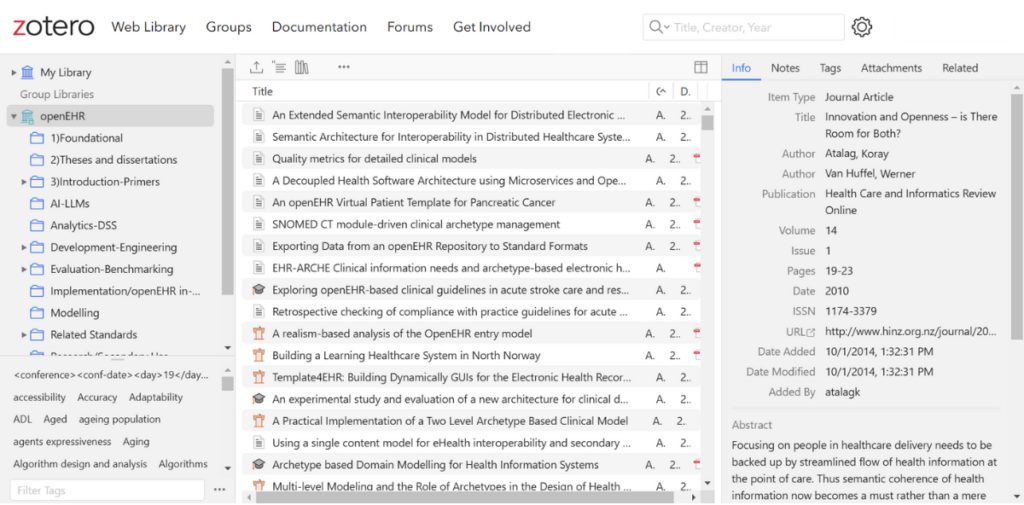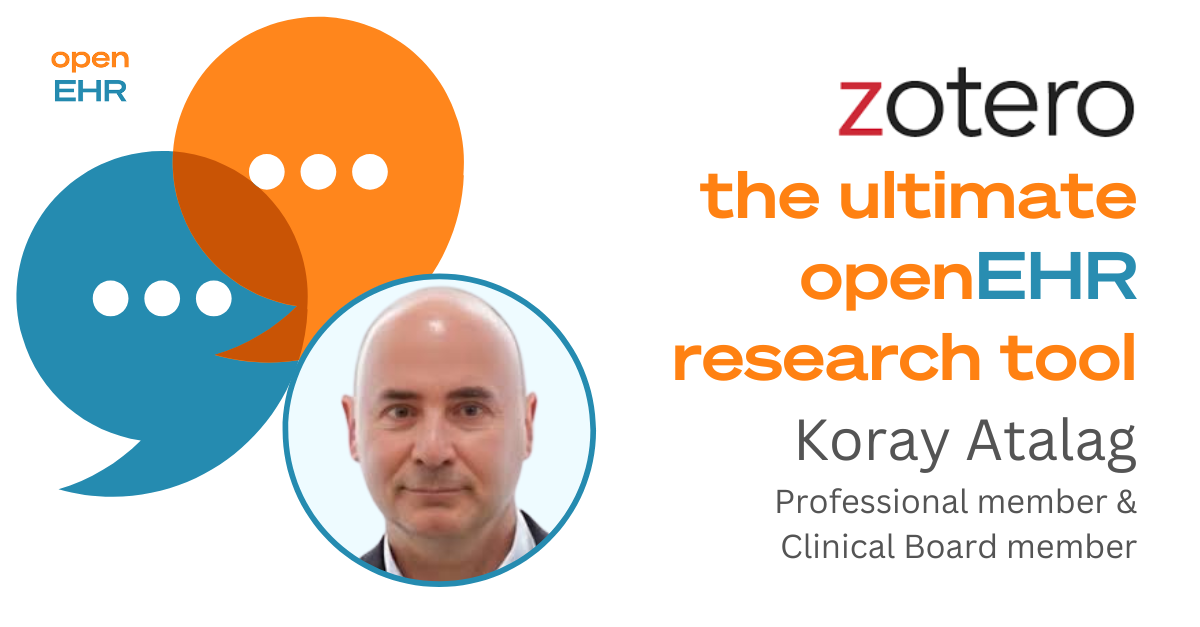Koray Atalag – openEHR professional member and one of our new Clinical Program Board members – gives us a deep dive into Zotero, a reference-management software for collating research papers and other resources and a veritable gold mine of openEHR reading…
Let’s start with the basics, Koray. What exactly is Zotero?
Well, like openEHR, Zotero is a free, open-source software designed to help researchers collect, organise and cite their reference materials. However, it does much more than that. For example, we’re using it broadly as a knowledge management tool for openEHR. It’s a digital library for all things openEHR, including journal articles, whitepapers, videos, podcasts, blogs/forums, clinical models and a lot of web-pages – which are all indexed and some with screenshots and full-text documents. For those in digital health and related disciplines, particularly working with openEHR, it’s invaluable. Personally, I use it for storing academic publications and anything that’s digital and visible on the screen through a web browser.
How did it all start?
I started using Zotero when I was writing my PhD thesis back in 2006, I think. Unlike many open source projects which disappear after a while, it went from strength to strength and improved a lot. My PhD work was on openEHR modelling so I had a lot of resources but in my personal library. Probably about 10 years or so ago I decided to create a group library for others to benefit from and transferred ownership to openEHR.
Sounds great. Now, openEHR research often involves a lot of different resources. How does Zotero help researchers manage that complexity?
You’re right: openEHR projects often require referencing a mix of academic papers, technical standards, clinical data models…. and Zotero lets you organise all those resources into collections and even allow annotations on documents. It keeps everything in one place, and the great thing is it captures all the data that’s available as metadata and indexes it, so you can search for anything from it. Then you can attach tags and add related resources to each one.
That must help when you’re working as part of a team.
It’s a huge help. Collaboration is where Zotero really stands out. It allows you to create group libraries – shared spaces where team members can add and access references. Everyone can contribute in real-time, ensuring that we’re all aligned and working with the same materials. Plus, you can control permissions, so for the current openEHR Library, anyone on the Internet can view citations but only team members can access full-text content.

What about when you’re actually writing your own material? Does Zotero help with that?
Yes. Zotero integrates with Word and Google Docs, so once you add the extension, you can easily insert citations into your document. Zotero automatically formats them, saving you from the headache of manually managing references. When you find a paper or a webpage you want to reference, you can save it to your Zotero library with just a click. It even automatically grabs the citation metadata – author, title, publication date – which means you don’t have to enter all those details by hand. It’s fast and accurate. So again, whether you’re writing a research paper or a technical spec on openEHR, it keeps everything streamlined.
So, it also helps with your productivity?
You can capture the resources you need without interrupting your workflow and you don’t lose time jumping between tabs, so you never have to worry about losing track of a resource again. That’s really useful in a field like ours – digital health – where managing your references and other knowledge resources efficiently is crucial.
How many openEHR members use Zotero?
Not enough! I think there’s only 23 people in our shared group – and it’s such a valuable resource, we really should be making more of it and it would be really good if we had an informal Zotero team to manage it. Maybe we can’t put everything there, but if you put the most pertinent resources, I think lots of people would benefit from it.
Plus, as Zotero is open-source, it aligns with openEHR’s collaborative and open standards approach. It’s continuously improved by the community, free to use, and it evolves based on the needs of its users. In health informatics, where open standards are key, Zotero fits perfectly. It’s all about making research more accessible, more organised, and more collaborative – just like openEHR. It’s a must-have for any health informatics professional.
Check out the openEHR library in Zotero and if you’d like to help curate the content – and you have access to pay-walled content through your institution – drop Koray Atalag an email and get on board.

Leave a Reply